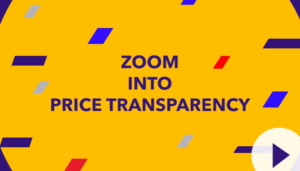Managing provider contracts has always been a complicated and cumbersome process. In fact, when you think of the pivotal role it plays in both healthcare at large and in managing provider-payer relationships, it’s amazing just how little contract management has evolved.
Modern technology has touched nearly every area of healthcare, yet so many health plans remain reliant on Excel spreadsheets and other error-prone manual tasks to manage contract negotiations effectively. These outdated processes slow response times and make it difficult to compare data to optimize contracts during negotiations.
But does it really have to be that way? Imagine a virtual button that instantly fixed those problems, shifting healthcare away from frustrating and tense negotiations to empowered conversations backed by detailed data and analysis.
That’s exactly what we need to modernize the healthcare financial experience. Stronger and more detailed data is an important avenue to help us get there with contract negotiations. It gives health plans the opportunity to educate and guide provider relationships and encourages transparency throughout the process.
Gathering this valuable data is virtually impossible to do manually. We need technology to help this. Contract modeling software is key to gaining the insight we need to change the narrative. Here are few specific examples of how data analysis improves contract negotiations:
Streamlining complex processes
Smart contract modeling software simplifies the intricate process of contract negotiations. Comparing different contracts and payments models is both swift and accurate to give health plans more valuable insight on provider contracts. For example, contract modeling software can integrate claims data and simulate various payment scenarios, enabling health plans to assess the financial impacts of different contract terms effectively.
Benchmarking and comparisons
One of the greatest assets of contract modeling is its ability to benchmark and compare contracts against governmental programs like Medicare or Medicaid and even MRF files. This capability is crucial because it provides a clear, objective baseline from which to negotiate. For example, contract modeling can take multiple commercial contracts and compare them to Medicare pricing and each other simultaneously, providing a tangible metric that can be used to negotiate more favorable terms. This not only ensures competitiveness but also fairness in pricing, which is often a contentious issue in negotiations.
Reducing time and enhancing accuracy
The traditional method of contract analysis is notoriously labor-intensive, which can easily reach 80 man-hours of highly skilled individuals. However, with contract modeling technology, what used to take days can now be accomplished in hours. This drastic reduction in time, coupled with enhanced accuracy, allows health plans to respond more agilely to rate changes or new proposals from providers.
Empowering negotiators with data
Data is a powerful tool in any negotiation, and contract modeling equips payers with data-driven insights that were previously difficult to obtain. By analyzing how different contract terms affect payments and comparing these across the industry, health plans can approach negotiations with a strong evidence base.
This capability transforms negotiations from opinion-based discussions to fact-based dialogues, making it easier to reach agreements that are beneficial for both payers and providers. That’s huge for reducing provider abrasion. The more evidence and facts you bring to the table, the better providers understand and appreciate your position.
Fostering transparency and trust
We need more trust and transparency in healthcare, and this is a great path to help us get there. By clearly showing how payment rates are derived and allowing both parties to see the same data and simulations, contract modeling technology fosters a more open negotiation process. This helps steer conversations more towards resolution and less towards conflict.
Integrating contract modeling into healthcare negotiations represents a significant leap forward in how payers and providers interact and agree on contract terms. It paves the way for fairer and more effective contracts.
Innovative tools like Zelis contract modeling will only become more central to reshaping these negotiations for the better. Ultimately, this is a crucial path to build trust among health plans and providers. The sooner we welcome and adopt this technology, the sooner we get there.





